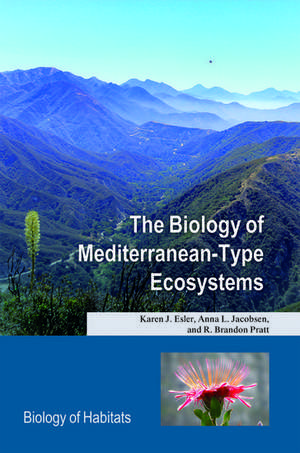The Biology of Mediterranean-Type Ecosystems: Biology of Habitats Series
Autor Karen J. Esler, Anna L. Jacobsen, R. Brandon Pratten Limba Engleză Paperback – 29 mar 2018
| Toate formatele și edițiile | Preț | Express |
|---|---|---|
| Paperback (1) | 361.10 lei 32-37 zile | |
| OUP OXFORD – 29 mar 2018 | 361.10 lei 32-37 zile | |
| Hardback (1) | 675.82 lei 32-37 zile | |
| OUP OXFORD – 29 mar 2018 | 675.82 lei 32-37 zile |
Preț: 361.10 lei
Preț vechi: 418.79 lei
-14% Nou
Puncte Express: 542
Preț estimativ în valută:
69.11€ • 71.88$ • 57.92£
69.11€ • 71.88$ • 57.92£
Carte tipărită la comandă
Livrare economică 03-08 martie
Preluare comenzi: 021 569.72.76
Specificații
ISBN-13: 9780198739142
ISBN-10: 0198739141
Pagini: 370
Ilustrații: Over 80 illustrations
Dimensiuni: 157 x 232 x 17 mm
Greutate: 0.62 kg
Editura: OUP OXFORD
Colecția OUP Oxford
Seria Biology of Habitats Series
Locul publicării:Oxford, United Kingdom
ISBN-10: 0198739141
Pagini: 370
Ilustrații: Over 80 illustrations
Dimensiuni: 157 x 232 x 17 mm
Greutate: 0.62 kg
Editura: OUP OXFORD
Colecția OUP Oxford
Seria Biology of Habitats Series
Locul publicării:Oxford, United Kingdom
Recenzii
The authors have done a great job in combining well-established concepts with recent novel research in topics associated with ecology (ecosystem, community, and functional ecology) and evolutionary biology. This combination provides a highly interesting review for those more experienced researchers who focus on exploring in depth the processes driving the similitudes and differences of these unique ecosystems. For myself, this book makes me ponder new questions while traveling by train through Mediterranean mixed-oak forests in south Spain.
The authors' noble aim is to inspire the next generation of researchers to discover and investigate this beautiful and special ecosystem, which it surely does.
The authors' noble aim is to inspire the next generation of researchers to discover and investigate this beautiful and special ecosystem, which it surely does.
Notă biografică
In her research, Professor Karen J. Esler simultaneously navigates disciplinary depths in ecology to work across disciplines, allowing her to contribute to inter-disciplinary and applied spaces. Her goal is to understand how drivers of change influence population and community structure and processes in mediterranean-type ecosystems, arid ecosystems, and riparian vegetation. The applied aspect of this work has been to develop and translate best-practice advice for management, restoration, and conservation. She is head of the Department of Conservation Ecology & Entomology at Stellenbosch University and a core team member of the DST-NRF Centre of Excellence for Invasion Biology. Professor Esler is the South African representative on the International Society for Mediterranean Ecology, and a member of the International Cooperative for the Management of Mediterranean-Climate Ecosystems (INCOMME)Dr. Anna L. Jacobsen's research examines plant structure and function, with a focus on woody plant anatomy and hydraulic transport. She has conducted research in arid and semi-arid shrub communities in both California and South Africa, with much of her research examining mediterranean-type plants and their responses to both drought and fire. As part of her research and as an active attendee of MEDECOS meetings, she has visited all five global MTEs and has participated in several global collaborative research projects. She has published numerous scholarly articles in her areas of expertise.Dr. Brandon Pratt is a plant ecophysiologist whose work focuses on mediterranean-type ecosystems. He has worked in both California and South Africa studying adaptations of shrub species to drought, fire, and the unique mediterranean-type environment. His work has been funded by the Andrew Mellon Foundation and the National Science Foundation, USA. As a professor, he teaches plant ecophysiology, ecosystems ecology, California natural history, and general botany at California State University, Bakersfield. He has regularly attended the mediterranean-ecosystems (MEDECOS) conferences since 2004.











